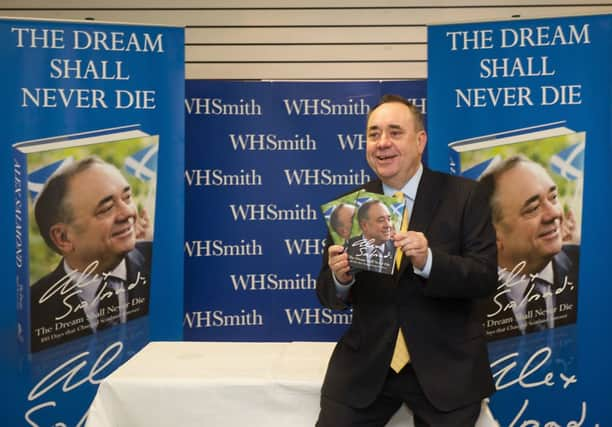Alex Salmond book has Robert The Bruce comparison


The flag-waving well-wishers that flocked to the former first minister’s book launch at the St Enoch Centre, Glasgow, were reminiscent of the crowds that took to the streets when Mr Salmond’s campaign for independence was on the march.
The former SNP leader could have been forgiven for being overcome by a feeling of déjà vu as he signed copies of Alex Salmond; the Dream Shall Never Die – 100 Days that Changed Scotland Forever.
Advertisement
Hide AdAdvertisement
Hide AdDespite losing the referendum, Mr Salmond’s book reveals that the politician looks back on it with huge fondness – unless you happen to be David Cameron or the BBC.
Adapting Charles Dickens’s Tale of Two Cities, Mr Salmond writes of the referendum: “It was the best of times. It was the best of times.”
Perhaps it is little wonder he is of that view, given Mr Salmond’s book recounts how he received the sort of adulation normally reserved for Sir Sean Connery as the vote approached.
Released yesterday, the first-hand account tells of golf matches, his battles with the Prime Minister and by his own admission – an uncanny grasp of political strategy.
For political anoraks, Mr Salmond reveals how he dealt with the difficulties of getting disparate political groups to work together for Yes Scotland. The solution was to draft in key SNP people like Angus Robertson, Kevin Pringle, Nicola Sturgeon and her husband Peter Murrell to “mimic” his party’s election organisation.
The gospel according to Salmond also reveals that he anticipated the Gordon Brown-inspired more powers “vow” in the tail-end of the campaign.
Having discovered that the Labour MP and strategist Douglas Alexander had become a keen student of Canadian politics, Mr Salmond thought that aspects of the Quebec No campaign would be adopted by Better Together.
“In Quebec there was a ‘new offer’. We therefore expect a ‘new offer’,” Mr Salmond writes.
Advertisement
Hide AdAdvertisement
Hide AdFor football fans, there is his subscription to a theory that an extended England run during the World Cup would be “a big positive” for the Yes campaign.
And on the campaign trial in Inverness, Mr Salmond compares his reception to that given to Sir Sean when on a trip to Scotland in support of the SNP in 2001.
For students of history, Mr Salmond could not resist comparisons between 2014 and the 1314 Battle of Bannockburn.
“You would have to be a dead soul not to be inspired by the stand taken by Bruce and his army – and foolish indeed not to see the analogies with the current political struggle,” he declares.
“… Like Bruce we are engaged with a force of awesome power. Like Bruce, we are faced with a pitched battle not completely of our choosing and like Bruce, we have to gamble to win the day.”
Unlike Bruce, Mr Salmond’s gamble did not pay off and he was defeated on 18 September. Therefore it stands to reason that in common with other political thrillers, the book has more than its fair share of villains.
Near the top of the list is the Prime Minister, who is criticised for believing the centenary of the Great War would remind Scots of “the glory of the Union”.
According to Mr Salmond, Mr Cameron’s attitude “betrayed a huge misunderstanding of the Scottish psyche”.
Advertisement
Hide AdAdvertisement
Hide AdMr Salmond argued: “As a martial nation Scots tend to revere soldiers but oppose conflict. We have no time for politicians who believe, like Cameron, that the anniversary of the bloody carnage of the First World War should be celebrated ‘like the Diamond Jubilee’.”
Nor was Mr Salmond’s wrath spared when it came to the BBC’s referendum coverage. The Beeb, he said, was regarded by many Scots as a “wicked stepmother” with a “demonstrable bias” against the SNP.
FOLLOW US
SCOTSMAN TABLET AND MOBILE APPS